What is the price of holding back the sea?
- Published
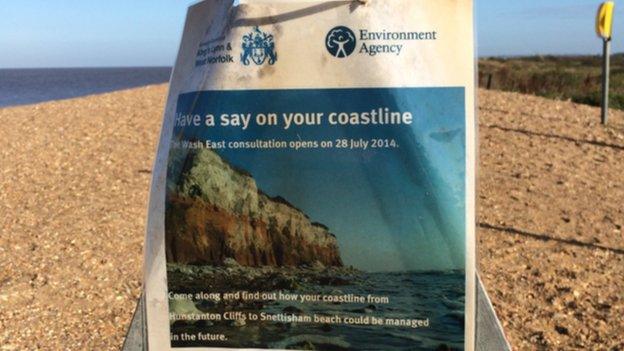
How can coastal communities be protected from flooding? I travelled around the Lincolnshire and Norfolk coast, talking to residents, farmers and business owners about the problems of protecting their lives and livelihoods from future inundations by the sea.
A pioneering scheme to hold back the sea is being tested on one of the most vulnerable shorelines in eastern England.
People living and working beside a beach in west Norfolk are being asked to pay for their own protection for the first time.
A so-called community interest company is being set up to raise the money needed to fund the upkeep of a coastal barrier.
Similar schemes have been launched inland but this will be the first on the coast where flooding is always considered more hazardous.
At a time of pressure on government spending on flood protection across the country, the authorities are pushing the idea that local residents and businesses should contribute the lion's share of the costs of building and maintaining barriers.
The plan, which covers 4.5 miles of the west coast of Norfolk, from the village of Heacham through Snettisham to Wolferton Creek, will be a key test of ministers' ambitions to create new sources of funding.
During the great storm surge of 1953, 30 people died in this area when floodwaters broke through the defences. And the anniversary is approaching of a storm on 5 December last year which flooded many hundreds of homes along the east coast of England.
While much of the shore around the Wash is protected by concrete walls or earth embankments, this section is guarded by a bank of shingle which needs to be reshaped annually, a task which will no longer be funded by public money after 2016.
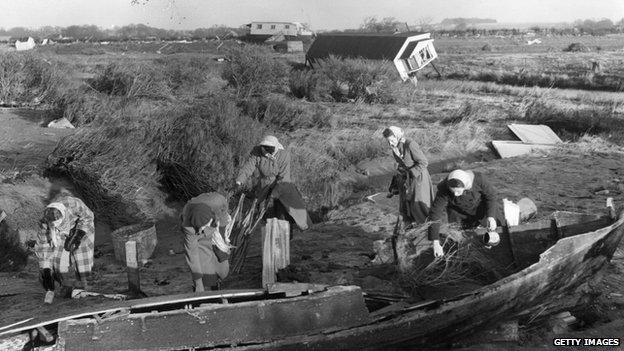
The Great Flood of 1953 killed more than 300 people in East Anglia
The area - which includes 4,000 caravans, holiday homes and some permanent houses - does not meet Treasury rules for government funding which require at least £8 in economic benefit for every £1 spent.
One of the architects of the scheme, Nigel Woonton of the Environment Agency, argues that because the funding is running out and because an extra levy cannot be imposed on council tax, voluntary contributions are the best option.
He said: "There's no question the money stops in 2016. And that's why we are working so hard with the community and local businesses, and have made clear that unless we can obtain partnership funding then we will not be able to maintain the defence.
"It's not passing the buck. It's following the rules. The Environment Agency doesn't make the rules, it follows them. In those areas which aren't protecting dense populations, those people will not get the money."
Mr Woonton estimates that if local contributions raise as much as 75% of what is needed, government funding might provide the rest.
Mike McDonnell, the owner of the Shepherds Port holiday park, which is one of the most vulnerable to coastal flooding, has agreed to lead the task of setting up the community interest company.
"We have no alternative but to approach people and ask them out of the goodness of their hearts to agree to make a contribution to this fund once it's set up. There are lots of good intentions but no means of getting everyone on board," he says.
Mr McDonnell believes caravan owners would be willing to pay £50 per year, chalet owners £100 and local residents about £1 per week.
A neighbouring farmer, Mark Robinson, whose fields run close to the sea, is a supporter of the scheme and says he would be happy to pay but he worries about long-term commitments: "How you get everyone to pay on a voluntary basis is incredibly difficult.
"And what happens if there's no near miss with a flood for 10 years? Enthusiasm for putting hands in pockets gets less and less, and then in year 12 it will all happen."
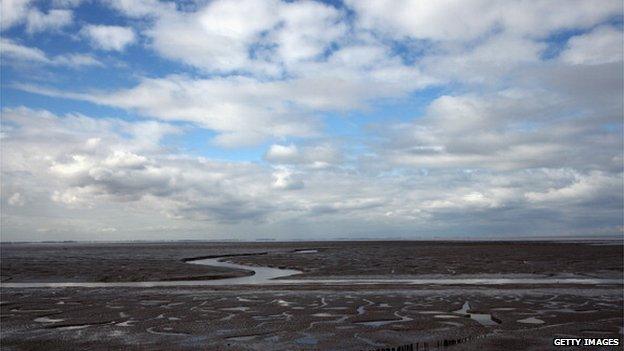
The Wash is a large bay sandwiched between Norfolk and Lincolnshire
Others are openly hostile to the plan.
William Searle, who runs sea trips, said: "I am against it. Everywhere around the coast has had their money and we haven't. Why should we pay? We are a tourist attraction and bring millions into the economy."
Ann Lamplaugh, a parish councillor in Snettisham, is equally opposed: "It's disgusting. I think the government should put it in, not us. Or if we have to put so much in, only 10%."
John Dobson, who represents Snettisham on Norfolk County Council, argues that coastal defence is too serious to be left to a voluntary scheme: "It's not the way we do business on important matters such as safety of life and safety of property - lives and property of people who are already paying taxes.
"We've got a threat from the sea and it's something we've got to deal with but not piecemeal with some made-up plan with voluntary subscriptions."
But Brian Long, a West Norfolk and Kings Lynn borough councillor, says local people need to be realistic about the chances of receiving government funding.
Mr Long, an advocate of the scheme, says: "Yes, it's easy to jump up and down and say it's not fair. Not much in life is. The time and effort put into this - it is the only way forward. The other alternative is not a good one: the area regularly flooded and the businesses not able to function.
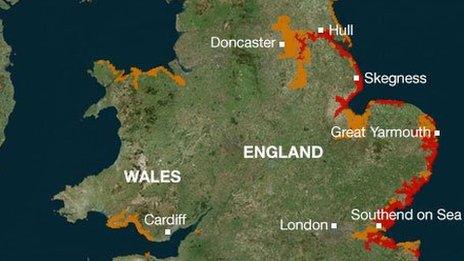
The Wash was one of the most vulnerable areas during last December's winter storms
"I'm hoping for the people who are here that it does work - if it doesn't, for the moment, we've got no Plan B," he adds.
So what if local businesses or residents decide not to pay up?
Mr Long has an answer which is bound to prove controversial: that flood defences could be built or maintained to protect those who do contribute while ignoring those who do not. "That's a bit of a blunt instrument but in reality those that aren't paying shouldn't get the benefit.
"There's only a certain amount of money that will go into the pot and if there's not sufficient funds to protect all of the coastline in question then it may have to be selective about where the works are done," he adds.
The degree of support for the scheme, and its success or failure, will be a crucial test of government plans for more so-called partnership funding in the future.
Listen to David Shukman's report on Holding Back The Sea at 21:00 GMT on Wednesday 19 November or catch it later on the BBC iPlayer.
- Published16 October 2014
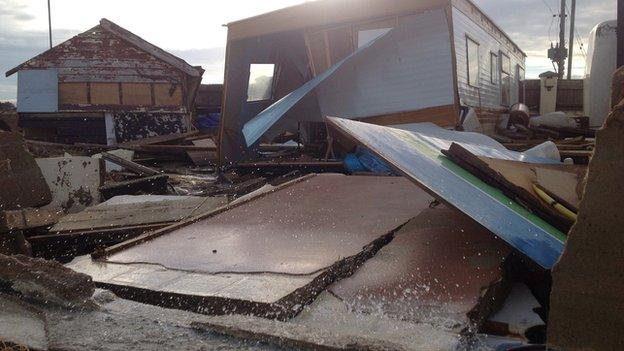
- Published6 December 2013
.jpg)